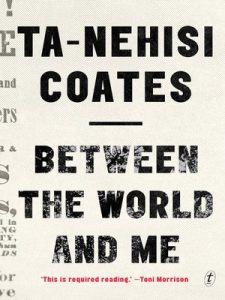How should a white Christian like me read Ta-Nehisi Coates’ Between the World and Me, a book written by a black atheist? With ears open and a heart willing to learn. That is, we should come first as students.
When first exposed to a subject, whether chemistry or theology or, in this case, the  experience of being black in America, initial forays into that subject feel foreign to the student. It feels as if she has landed among an exotic people speaking a foreign tongue. The words are all new, and the questions being asked and explored are ones she has never before considered. A good student’s response will be to listen, to be quiet, to learn the language, and to hear how the questions are being answered.
experience of being black in America, initial forays into that subject feel foreign to the student. It feels as if she has landed among an exotic people speaking a foreign tongue. The words are all new, and the questions being asked and explored are ones she has never before considered. A good student’s response will be to listen, to be quiet, to learn the language, and to hear how the questions are being answered.
In Between the World and Me Coates speaks to his son but aims his words to we who listen in. As he traces his own awakening self-awareness as a black man from the streets of Baltimore, to a student at Howard University, to a writer in New York City, he provides an engagingly written assessment of life as he has seen it and the world as he has struggled to understand it. His assessment seems at times harsh, at times unfair, at times insightful, and at all times challenging.
Those new to this literature and to this world need to listen. His observations seem foreign, but such is the nature of learning. Some will be tempted to condemn, to judge, or to say he’s overstated his case. Maybe he has. Or maybe he has to. But we must labor to understand before we condemn. And sometimes, too often, if something threatens us, we don’t take the time to understand. He wants to unsettle the comfort and challenge the assumptions of “those who see themselves as white.”
And this does unsettle me. Is the world in fact arrayed in a way of violence toward the black body as he contends? It seems a plausible position, as cursory familiarity with history and the news suggests. As he writes to his son,
“The price of error is higher for you than it is for your countrymen, and so that America might justify itself, the story of a black body’s destruction must always begin with his or her error, real or imagined.” (96)
It was Trayvon Martin’s ‘error’ of walking through a white neighborhood in a hoodie, for example, that got him shot. The price of error is higher for the black man. That sounds right.
I have read and thought too little about the subjects he raises to be able to offer an informed critique of the book. I leave that to others. But we who live lives in an aura of safety and comfort are in need of this education, foreign though it may seem and feel. Our job may be in this case to be quiet and to listen. We need to allow new questions to form in our minds and be considered. This could be the beginning of our education.
—
[Note: I would not draw attention to Coates’ religious convictions except for the fact that he himself makes a point of his atheism. He laments that he cannot find the sort of perspective that faith has brought to many like him. This explains to some degree his emphasis upon the black ‘body’ and not ‘soul’ or ‘spirit’. I respect his honesty.]
